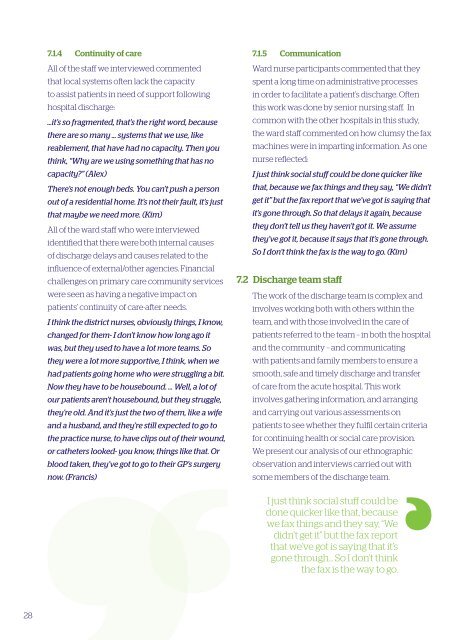Hospital Discharge
3Jzx309Yruj
3Jzx309Yruj
You also want an ePaper? Increase the reach of your titles
YUMPU automatically turns print PDFs into web optimized ePapers that Google loves.
7.1.4 Continuity of care<br />
All of the staff we interviewed commented<br />
that local systems often lack the capacity<br />
to assist patients in need of support following<br />
hospital discharge:<br />
…it’s so fragmented, that’s the right word, because<br />
there are so many … systems that we use, like<br />
reablement, that have had no capacity. Then you<br />
think, “Why are we using something that has no<br />
capacity?” (Alex)<br />
There’s not enough beds. You can’t push a person<br />
out of a residential home. It’s not their fault, it’s just<br />
that maybe we need more. (Kim)<br />
All of the ward staff who were interviewed<br />
identified that there were both internal causes<br />
of discharge delays and causes related to the<br />
influence of external/other agencies. Financial<br />
challenges on primary care community services<br />
were seen as having a negative impact on<br />
patients’ continuity of care-after needs.<br />
I think the district nurses, obviously things, I know,<br />
changed for them- I don’t know how long ago it<br />
was, but they used to have a lot more teams. So<br />
they were a lot more supportive, I think, when we<br />
had patients going home who were struggling a bit.<br />
Now they have to be housebound. … Well, a lot of<br />
our patients aren’t housebound, but they struggle,<br />
they’re old. And it’s just the two of them, like a wife<br />
and a husband, and they’re still expected to go to<br />
the practice nurse, to have clips out of their wound,<br />
or catheters looked- you know, things like that. Or<br />
blood taken, they’ve got to go to their GP’s surgery<br />
now. (Francis)<br />
7.1.5 Communication<br />
Ward nurse participants commented that they<br />
spent a long time on administrative processes<br />
in order to facilitate a patient’s discharge. Often<br />
this work was done by senior nursing staff. In<br />
common with the other hospitals in this study,<br />
the ward staff commented on how clumsy the fax<br />
machines were in imparting information. As one<br />
nurse reflected:<br />
I just think social stuff could be done quicker like<br />
that, because we fax things and they say, “We didn’t<br />
get it” but the fax report that we’ve got is saying that<br />
it’s gone through. So that delays it again, because<br />
they don’t tell us they haven’t got it. We assume<br />
they’ve got it, because it says that it’s gone through.<br />
So I don’t think the fax is the way to go. (Kim)<br />
7.2 <strong>Discharge</strong> team staff<br />
The work of the discharge team is complex and<br />
involves working both with others within the<br />
team, and with those involved in the care of<br />
patients referred to the team – in both the hospital<br />
and the community – and communicating<br />
with patients and family members to ensure a<br />
smooth, safe and timely discharge and transfer<br />
of care from the acute hospital. This work<br />
involves gathering information, and arranging<br />
and carrying out various assessments on<br />
patients to see whether they fulfil certain criteria<br />
for continuing health or social care provision.<br />
We present our analysis of our ethnographic<br />
observation and interviews carried out with<br />
some members of the discharge team.<br />
I just think social stuff could be<br />
done quicker like that, because<br />
we fax things and they say, “We<br />
didn’t get it” but the fax report<br />
that we’ve got is saying that it’s<br />
gone through... So I don’t think<br />
the fax is the way to go.<br />
28


